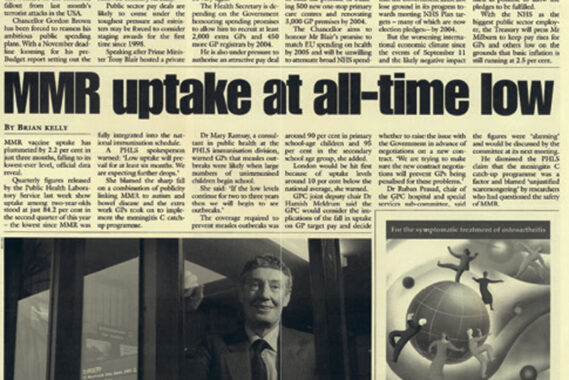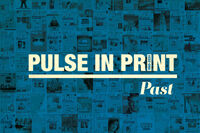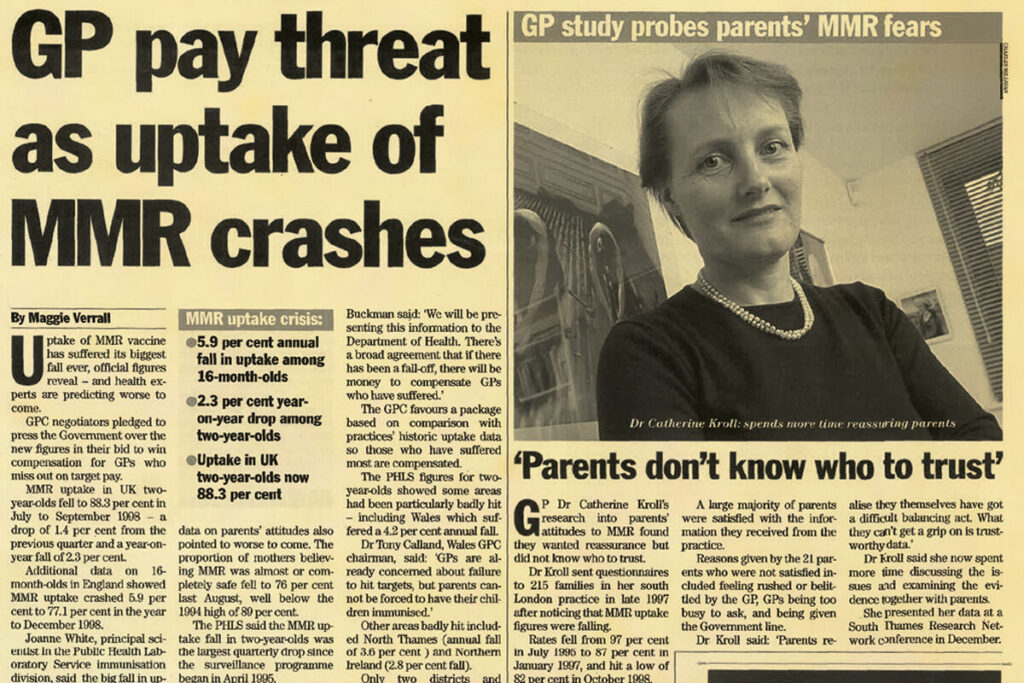Pulse in Print: The long-term impact of the MMR scandal


As part of our Pulse in Print series looking at the major stories in general practice, Jaimie Kaffash looks at how a gastroenterology reader derailed the fight against childhood infectious diseases
‘MMR vaccine uptake was constantly in the news for public health reasons, and also since GP pay was linked to immunisation targets. GPs also reported to Pulse at the time that the refusal of then Prime Minister Tony Blair to say whether his son Leo had the jab led to more parents refusing the vaccine, showing how political the issue had become.’
Brian Kelly was clinical reporter and clinical news editor, 2001-2005
A paper with the rather dry title of ‘Ileal-lymphoid-nodular hyperplasia, non-specific colitis, and pervasive developmental disorder in children’ led to one of the biggest public health crises in the UK and beyond. Andrew Wakefield’s study in the Lancet linking the MMR jab to autism started a chain of events that caused lasting damage to a cohort of children.
The infamous study in 1998 claimed there was an association between autism and intestinal abnormalities in 12 children and a possible relation with MMR vaccination. It concluded that the three vaccines should be administered separately.
The study was junk. Not only was it based on a tiny number of children, it also relied on recollections from the parents of those children and there were even allegations of results being fabricated. Wakefield himself was a reader in gastroenterology, with no expertise in immunology or neurology.
Yet his conclusions gathered traction at the time, not only in the UK and Ireland but in the United States too. This became a moral panic, with other studies being misinterpreted by the national media and fuelling fears around vaccines. As a result, concerned parents refused the MMR vaccine. It was left to GPs to convince them otherwise.

For the BMA’s GP Committee, they had to fight on behalf of GP practices whose income was plummeting as a result of vaccine refusal, with no exception reporting in place to allow them to discount refuseniks from their targets – a situation that still exists for childhood vaccinations.
But the main impact was the number of children who failed to receive vaccinations due to the paper – which continued for years. At its worst, MMC uptake sunk to around 83% in 2004. Until then, measles cases per year were hovering around 100-150 a year – after 2005, with a couple of exceptions, it was around 750-1,200. It was also having repercussions years later – indeed, a large outbreak of mumps in universities in early 2020 was blamed on the fact these students were born in the late 1990s and early 2000s.
[And just this year, we have seen an outbreak of measles, which is following a trend. European countries saw a 30-fold rise in measles cases last year amid declining vaccination coverage, according to the World Health Organization (WHO).
It took a long time before those in the medical establishment who supported Wakefield admitted to errors. His hospital, the Royal Free in London, continued to support the research beyond 2004 when concerns about the conduct of the study (and not just the conclusions) were raised.
Wakefield was struck off the GMC register in 2010, and the Lancet only retracted the paper that year. The GMC ruled Dr Wakefield had shown a ‘callous disregard for the distress and pain’ of the children he studied, and said he had abused his trust as a medical practitioner and brought the medical profession into disrepute. Following reporting by Brian Deer, it turned out he had been hired by a lawyer who was launching a speculative class action legal case against the manufacturers of the vaccine, and Wakefield himself had developed single use vaccines.
Wakefield can’t be blamed for the start of the anti-vaccination movement – it was around in the smallpox era and, especially in the case of experiments on certain ethnic groups, some distrust was fully justified. But it did lay the groundwork for the sort of hesitancy in this digital age that we saw most obviously with Covid.
As Dr Michael Fitzpatrick, GP and author of MMR and Autism: What Parents Need To Know, said: ‘The damaging impact of the MMR-autism theory was the result of a comprehensive failure of quality control, a failure involving his superiors at the Royal Free, the Lancet, the wider scientific community and the media.’

‘Two decades since I reported this and once again we are facing the same consequences of falling vaccine uptake. Andrew Wakefield has cast a long shadow but post-pandemic there are now a whole host of other factors at play. It does feel sometimes like nothing ever changes except the names of the NHS organisations trying to tackle it.’ Emma Wilkinson, Pulse staff reporter, 2000-2005, current Pulse freelancer
Pulse October survey
Take our July 2025 survey to potentially win £1.000 worth of tokens

Visit Pulse Reference for details on 140 symptoms, including easily searchable symptoms and categories, offering you a free platform to check symptoms and receive potential diagnoses during consultations.










